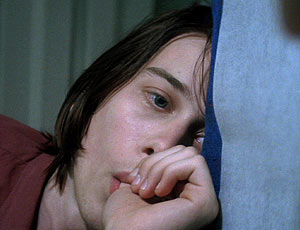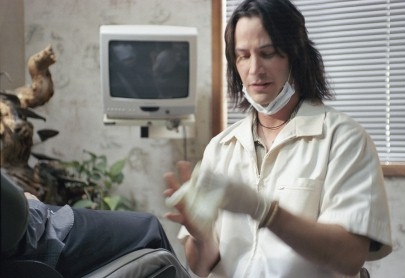Hello, old friend: “Much Ado About Nothing” (1993)
23 September 2012
 “Sigh no more, ladies, sigh no more,” we see in white letters move across the dark screen at the same teasingly slow pace as Emma Thompson’s breathy voice reads it, almost as if she’s whispering into your ear across a pillow. Even after we break from the black screen to see the assembled, laughing group lounging on the grass on a Tuscan hillside, you know without a doubt that this is going to be the silliest ado about nothing ever, and you’re probably going to enjoy every minute of it.
“Sigh no more, ladies, sigh no more,” we see in white letters move across the dark screen at the same teasingly slow pace as Emma Thompson’s breathy voice reads it, almost as if she’s whispering into your ear across a pillow. Even after we break from the black screen to see the assembled, laughing group lounging on the grass on a Tuscan hillside, you know without a doubt that this is going to be the silliest ado about nothing ever, and you’re probably going to enjoy every minute of it.
“Men were deceivers ever,” Thompson continues, and slowly the camera moves to show her tanned skin, bare feet, and floating golden-brown hair as she sits in the crook of an olive tree.
Then sigh not so, but let them go,
And be you blithe and bonny,
Converting all your sounds of woe
Into hey nonny nonny.
I saw Much Ado About Nothing when it was still in theaters, back when we all thought that Em and Ken (Kenneth Branagh, her director and co-star) were the model of a smart, talented, creative couple. Before they split up, that is. Here they appear golden, perfectly matched, the true stars of the story in every respect. When you remember this film, you remember their transcendence.
 If coming back reminds you of their perfection, you have probably forgotten (as I had) how truly awful some of the other casting is. Let’s start with the worst: gawd, Keanu Reeves as the evil Don John. Even the directing in Reeves’ scenes gets worse, as if Branagh decided that nothing could be done with an actor who had no grasp of the role or the lines, so why even try? Second worst is Michael Keaton as the farting, spitting Irish night watch constable Dogberry — an appearance so awful I’d completely repressed it. Better, but still cringe-making, is a very young Robert Sean Leonard who falls for an equally very young Kate Beckinsale. One tends to want to forgive Leonard his acting excesses, as he manages just fine when he’s only responsible for appearing smitten.
If coming back reminds you of their perfection, you have probably forgotten (as I had) how truly awful some of the other casting is. Let’s start with the worst: gawd, Keanu Reeves as the evil Don John. Even the directing in Reeves’ scenes gets worse, as if Branagh decided that nothing could be done with an actor who had no grasp of the role or the lines, so why even try? Second worst is Michael Keaton as the farting, spitting Irish night watch constable Dogberry — an appearance so awful I’d completely repressed it. Better, but still cringe-making, is a very young Robert Sean Leonard who falls for an equally very young Kate Beckinsale. One tends to want to forgive Leonard his acting excesses, as he manages just fine when he’s only responsible for appearing smitten.
If those American casting decisions make me want to cry, let me note that Denzel Washington does a great job as Don Pedro, Prince of Aragon, who doesn’t win any woman at all. Those lines roll out of Washington’s mouth; it’s as if the Tuscan sun filled his body with the same grace that made Ken & Em so perfect. It’s a terrific feat considering that Washington had only done Shakespeare once before (on Broadway as Richard III; he appeared again, in 2005, in Julius Caesar).
Don Pedro sees the true worth of Beatrice (Thompson), even as she watches her young cousin accede to marriage so young. Pedro sits with her watching the proceedings. He even asks her to marry him, but she knows better than to believe they might be happy. He looks at her and pays her the most truthful compliment we can imagine:
Don Pedro: In faith, lady, you have a merry heart.
Beatrice: Yea, my lord, I thank it, poor fool, it keeps on the windy side of care.
“The windy side of care” — now that’s why Shakespeare still moves us. Those practically throwaway lines that make you want to roll them over in your mouth like Everlasting Gobstoppers.
So let’s return to repressing the film’s weaker actors and focus on what’s important: the tale of Beatrice and Benedick (Branagh), who love to bicker and tease one another. Of course their friends are able to trick them into loving one another: with all the knife-edge wordplay between them, it’s as if they’ve been having intellectual sex for years.
Maybe that’s what makes those scenes so ridiculously pleasurable on multiple viewings. Two people who love to hate one another, easily fooled into believing that the other is hopelessly in love; somehow the prospect of all that verbal sparring signifying an abiding love makes sense.
I caught Much Ado late last night on PBS (after grading almost 20 papers, thank you very much) and found my emotions going up and down relative to the amount of screen time for Ken & Em; and yet honestly, I’d watch it again this minute despite the atrocities committed by Reeves and Keaton. That scenery! those lines! the patina of Emma Thompson’s glowing brown skin! and most of all, the lesson imparted to all us ladies who know that men always have one foot on sea and one on shore:
Then sigh not so, but let them go,
And be you blithe and bonny,
Converting all your sounds of woe
Into hey nonny, nonny, nonny.
Sing hey, nonny nonny. It’s the only way to face all those remaining papers … and the work week ahead.
“Thumbsucker” (2005): see it.
28 September 2010
With a title like this, it sounds like one of those films that’s going to traffic in indie wackiness, like “Lars and the Real Girl” (2007) sounded when you first heard about it. “Lars” started out quietly wacky, so when it became wonderful and profound it snuck up on you; and while Mike Mills’ “Thumbsucker” quickly gets to a similar place, the director’s only gesture to kookiness is his (brilliant) decision to cast Keanu Reeves as a mystical orthodontist. Instead, this film opens with something disturbing — 17-year-old Justin still sucks his thumb and wants so badly to put it behind him — and slowly and gently pries open the question of identity, the crutches we use in lieu of true comfort, and the ways our needs for unequivocal love can be foiled by our unwillingness to offer it to others.

There’s something so primal, so familiar, so depressing about the way Justin (Lou Pucci) hides in a bathroom stall at school to suck his thumb. He sneaks it in at home, too, but it’s easy to get caught by his father, Mike (Vincent D’Onofrio). Neither Mike nor Justin’s mother Audrey (Tilda Swinton) know what to do about it — because they’ve got their own crutches. At the moment, Audrey’s obsessed with entering a contest to meet a cheesy TV actor, and no matter how much her sons make fun of her, she’s determined to try. “It’s just for fun!” she exclaims anytime Justin asks if there’s something up in her marriage. She means it, too — but, like Justin, there’s something she needs that she isn’t getting.

Enter, of all people, a shaggy-haired Keanu Reeves as Perry the orthodontist, who intuits Justin’s secret. He’s a breath of fresh air because he sees thumbsucking as normal, reasonable — just a problem for maintaining straight teeth. “It’s an understandable habit,” he says. “In fact, what’s strange is that people ever quit.” In a brilliantly wry short sequence (and yes, that’s the second time I’ve used “brilliant” in connection to Keanu Reeves!), he holds forth about all the small, forgotten memories that contribute to our crippled sense of self. “Some dumb babysitter holds your mouth shut so she can watch her soap operas in peace, and at forty you wonder why you can’t stay married.” He convinces a skeptical Justin to try hypnosis, which they undertake right there in the dentist’s chair, gazing at one of Perry’s hippie-dippy posters of wolves howling at the moon. It works: Justin leaves the office unable to suck his thumb anymore — but the thing is, without his thumb he has nothing, and he’s adrift. It’s no wonder that when a teacher suggests he try attention-deficit disorder medication, he leaps at the chance to solve his problems with a pill: the pill becomes his replacement thumb. And as far as Justin’s concerned, it’s awesome. Sadly, due to the beautiful strains of Elliott Smith covering Cat Stevens’ song “Trouble” — echoes of how that song infused “Harold and Maude” (1973) — we know his new confidence won’t last. (BTW: the soundtrack, mostly by the Polyphonic Spree with extra cuts by Smith, is fantastic.)
There are a lot of things to love about this film , but I’ll just focus on three: first, Lou Pucci as Justin. He’s so good (and was recognized with Best Actor honors at Sundance and the Berlin International Film Festival). He alternates between an awful kind of introversion in the earliest scenes — thumb in mouth, hair falling down over his face — to an equally awful new confidence once he becomes the relentless, successful king of his high school debate team. With his hair brushed back neatly and his deceptively innocent-looking eyes, it’s disconcerting when he takes apart other teams. “It’s my professional opinion that you’ve become a monster,” his debate coach tells him in the end. But in between Pucci offers us glimpses of true emotional openness with his big eyes and youthful hope. Which leads to my second favorite thing: Pucci’s exchanges with the inscrutable actor, Tilda Swinton, as his mother Audrey. Not only do they look like mother and son, and not only do they manage to create utterly believable scenes of typical mother-son tension; they also capture with amazing screen chemistry those few lingering moments of a more intense love for one another left over from childhood, a love that renders Pucci as soft and feminine as I’ve ever seen a male actor appear. I’d say it was quasi-sexual, though I don’t want to creep anyone out: it’s not creepy, it’s real, and such a beautiful encapsulation of how much Justin wants something from his mother that he can’t possibly articulate. I’ve never seen anything like it onscreen, and it’s great. (In fact, considering that we already know how great Tilda Swinton’s acting is, this only further underlines my first point: it great acting chops in Pucci to keep up with Swinton.)
, but I’ll just focus on three: first, Lou Pucci as Justin. He’s so good (and was recognized with Best Actor honors at Sundance and the Berlin International Film Festival). He alternates between an awful kind of introversion in the earliest scenes — thumb in mouth, hair falling down over his face — to an equally awful new confidence once he becomes the relentless, successful king of his high school debate team. With his hair brushed back neatly and his deceptively innocent-looking eyes, it’s disconcerting when he takes apart other teams. “It’s my professional opinion that you’ve become a monster,” his debate coach tells him in the end. But in between Pucci offers us glimpses of true emotional openness with his big eyes and youthful hope. Which leads to my second favorite thing: Pucci’s exchanges with the inscrutable actor, Tilda Swinton, as his mother Audrey. Not only do they look like mother and son, and not only do they manage to create utterly believable scenes of typical mother-son tension; they also capture with amazing screen chemistry those few lingering moments of a more intense love for one another left over from childhood, a love that renders Pucci as soft and feminine as I’ve ever seen a male actor appear. I’d say it was quasi-sexual, though I don’t want to creep anyone out: it’s not creepy, it’s real, and such a beautiful encapsulation of how much Justin wants something from his mother that he can’t possibly articulate. I’ve never seen anything like it onscreen, and it’s great. (In fact, considering that we already know how great Tilda Swinton’s acting is, this only further underlines my first point: it great acting chops in Pucci to keep up with Swinton.)
The third favorite thing I’ll mention about the film is that “Thumbsucker” somehow manages throughout to show all of its characters in motion — that is, Justin’s problems and his attempts  to change don’t appear against a static background, but are likened to the problems and changes of everyone else. From Perry the orthodontist to Justin’s “normal” little brother, from Audrey to the girl Justin has a crush on, each character sees things go from bad to worse and back again; everyone has a story arc. No one is normal, and everyone’s searching for the love that might bring them into equilibrium. The very last scene, in which Justin is back in that sad little orthodontist’s office while Perry sucks down a couple of cigarettes and waxes philosophical, is so perfect I wanted to cry, except it was too true and funny for that.
to change don’t appear against a static background, but are likened to the problems and changes of everyone else. From Perry the orthodontist to Justin’s “normal” little brother, from Audrey to the girl Justin has a crush on, each character sees things go from bad to worse and back again; everyone has a story arc. No one is normal, and everyone’s searching for the love that might bring them into equilibrium. The very last scene, in which Justin is back in that sad little orthodontist’s office while Perry sucks down a couple of cigarettes and waxes philosophical, is so perfect I wanted to cry, except it was too true and funny for that.
The director Mike Mills is already getting great reviews for his new film, “Beginners” (2010) with Ewan McGregor and Christopher Plummer, about a man whose father decides to come out of the closet at age 75. I can assure you I’ll be first in line when it’s released here.








